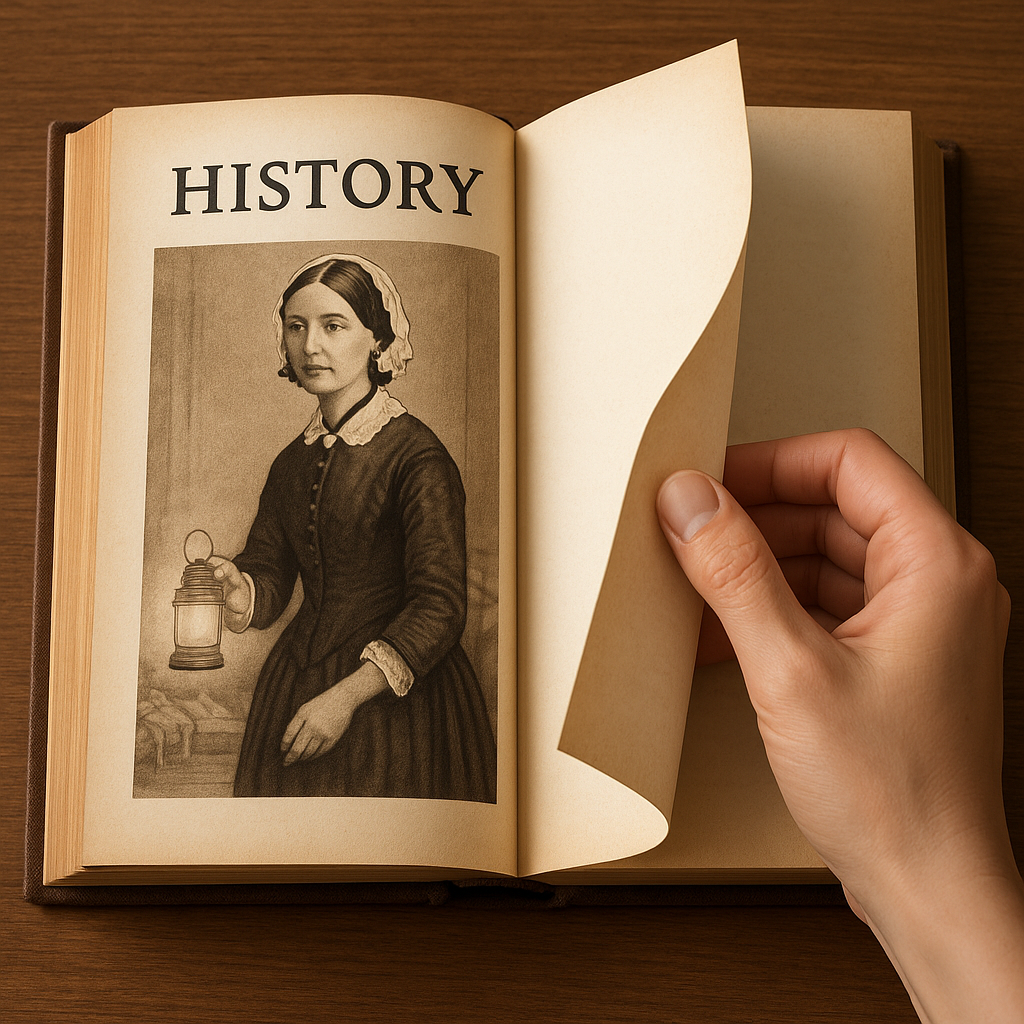Turning the Page on Florence
This year I have been invited to three separate events bearing the name Florence Nightingale and I have declined every single one. For those who may know me well, you know that I am not a fan! Should she have a place in history, absolutely! Does she deserve much more, probably not! Does nursing need to come to terms that the lady with the lamp comes with a lot of historical inaccuracies… yes!!!
When we speak of nursing’s legacy, the name Florence Nightingale inevitably rises to the forefront. The “Lady with the Lamp” is enshrined in our profession as a pioneer, moral exemplar, nurse-educator, public-health reformer, and the mother of modern nursing. And indeed, she contributed to important advances in the mid-19th century: sanitary reform, early use of statistics, the establishment of a structured nursing training school. But as we engage in honest, decolonial reflection on the roots of nursing ethics and professional practice, it becomes increasingly difficult and frankly unethical to keep Nightingale’s legacy uncritically elevated as our central icon. Her vision and actions were deeply entwined with the British empire, white supremacist hierarchies, and colonial ideologies whose effects continue to ripple through health care and nursing today.
Nightingale worked from privilege: born into a wealthy British family, educated, socially connected, positioned to influence policy. Her reforms in military hospitals during the Crimean War (1853-56) reportedly improved conditions and lowered mortality in those specific institutional settings. But beyond that, her writings and advisory role in colonial contexts reveal participation in the machinery of an empire built on the dispossession, exploitation and death of Indigenous and colonized peoples. For example, in a report on “native colonial schools and hospitals” she wrote: “Every society which has been formed has had to sacrifice large proportions of its earlier generation to the new conditions of life arising out of the mere fact of change.” In the same report she identified high mortality among Indigenous children as caused essentially by their own “native dwellings” rather than the colonial systems that produced the conditions of disease. In another analysis she defended the idea that assimilation into “civilized” British ways was the duty of the colonized, even at the cost of their lives.
It is not enough to say “she was of her time.” That phrase risks excusing or burying the ways nursing as a profession remains embedded in structures of whiteness, hierarchy, and imperialism. Scholars argue that nursing’s “origin story” centered on Nightingale helps perpetuate a narrative where white, Christian, British women are the normative model of nursing; other traditions, perspectives, and contributions remain marginalized. For example, the argument that Nightingale hired only white nurses, explicitly framing the profession in racialized terms, underlines how early nursing practice was tied to exclusion and racial privilege.
What does this mean for nursing ethics, for a profession committed to justice, equity, and inclusive care? It means we must rethink who we honor, which foundations we build upon, and whose voices we centre. Keeping Nightingale as the default hero, without naming the harm of her ideology and the limits of her vision, risks perpetuating the very structures nursing seeks to dismantle: the othering of Indigenous, Black and racialized bodies; the subordination of non‐Western knowledge; the assumption that “civilized” Western systems are the baseline of health. In other words, if nursing ethics is to be responsive to the realities of health disparities, structural racism, and colonial legacies, we cannot anchor them in a figure who championed those legacies.
Moving beyond Nightingale does not mean erasing her entirely or denying her contributions. It means situating her historically and ethically, recognizing that alongside sanitation and statistics were imperialism and hierarchy. It means decentralising her as the singular founding figure, and instead lifting up the many nurses, healers, traditions and systems that nursing history has marginalized: Indigenous healers, nurses of color, non‐Western nursing traditions, anti‐colonial nurse-leaders. It means revising our ceremonies, awards, curricula, training frameworks, so that they reflect plurality, equity and cultural humility. And it means that our nursing ethics should stem not from a white supremacist structure of “we save the others,” but from partnership, community wisdom, mutual respect, justice‐oriented care.
Imagine a nursing profession whose ethical bedrock acknowledges: health care cannot be divorced from power, race, history; that nurses must engage with social justice of the communities they serve; that the model of care is not “benevolent imperial nurse” but “partner, advocate, co-learner.” In that vision, Nightingale becomes one voice among many, not the towering unquestioned icon. Awards and events bearing her name can be phased out and replaced by honors that reflect diverse contributions and decolonial values. Training can incorporate critical reflection on how the profession was shaped by empire and racism, and how it must now be reshaped. Our frameworks for mentoring and ethics can model transparency, reflexivity, and inclusion.
If we are serious about a new era of nursing, one that serves all populations equitably, that seeks to dismantle structural barriers, that honors Indigenous, Black, and minoritized voices, then we must also be serious about the legacy we build on. It is time to turn the page on Florence Nightingale as the unchallenged icon and shift to an ethics of nursing grounded in justice, equity, diversity, and inclusion.
Additional Resources:
Nursing Clio — “The Racist Lady with the Lamp”
https://nursingclio.org/2020/11/05/the-racist-lady-with-the-lamp/Nursing Clio — “Moving Beyond Florence: Why We Need to Decolonize Nursing History”
https://nursingclio.org/2021/02/04/moving-beyond-florence-why-we-need-to-decolonize-nursing-history/LitHub — “The Problematic Myth of Florence Nightingale”
https://lithub.com/the-problematic-myth-of-florence-nightingale/Cancer Nursing Today — “Revisiting Florence Nightingale: Racism in American Nursing”
https://www.cancernursingtoday.com/post/revisiting-florence-nightingale-racism-in-american-nursingAmerican Nurses Association — The History of Racism in Nursing
https://anaprodsite2.nursingworld.org/globalassets/practiceandpolicy/workforce/commission-to-address-racism/1thehistoryofracisminnursing.pdfNurses You Should Know


